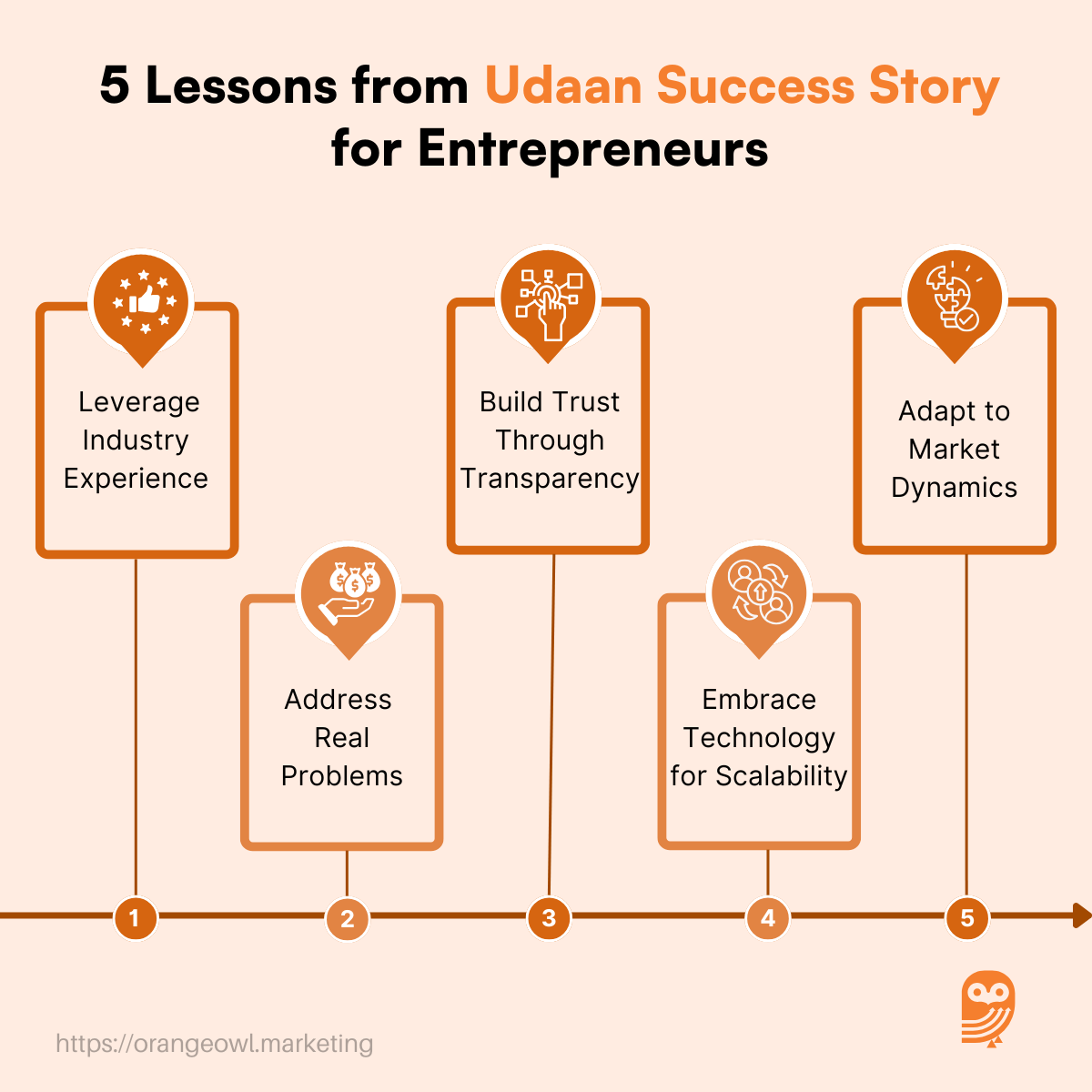Udaan Success Story: 5 Impactful Lessons for Every Entrepreneur
Vivek Goel
May 21, 2025

Table of Contents
Introduction: Transforming India’s B2B Landscape
In 2016, a trio of visionary entrepreneurs—Sujeet Kumar, Amod Malviya, and Vaibhav Gupta—embarked on a mission to solve one of India’s most overlooked yet critical problems: the inefficiencies in the B2B supply chain for small and medium enterprises (SMEs). Having played instrumental roles in Flipkart’s early success, the trio understood the intricacies of Indian commerce, logistics, and technology. What they observed was a vast market dominated by millions of small retailers, yet deeply fragmented, informal, and underserved when it came to digital infrastructure and reliable supply chains.
They saw that while e-commerce had revolutionized consumer retail, the same had not happened in the B2B space. Traditional distribution networks were outdated, opaque, and dependent on multiple intermediaries, leading to inflated costs and delays. Furthermore, small businesses often lacked access to timely credit and faced persistent challenges in sourcing quality goods at competitive prices.
In response to this massive yet unmet need, the founders launched Udaan—a tech-driven B2B e-commerce platform designed to empower retailers, wholesalers, traders, and manufacturers across India. With Udaan, they aimed to simplify how businesses discover products, manage logistics, and access working capital, all within a single digital ecosystem.
Today, Udaan has emerged as India’s largest B2B e-commerce marketplace, connecting over 3 million retailers with more than 25,000 sellers across 900+ cities and towns. The platform spans multiple verticals including electronics, fashion, groceries, home essentials, pharmaceuticals, and more—offering a one-stop solution for business owners to procure goods directly, affordably, and reliably.
“Almost 94% of product sales in India happen through mom-and-pop stores. But small store owners have major sourcing and supply chain problems. We felt catering to their needs is a huge opportunity.”— Sujeet Kumar, Co-founder, Udaan
Udaan’s journey is not just a tale of business success—it’s a story of digital inclusion. By bridging the gap between technology and traditional trade, Udaan is reshaping the very fabric of India’s wholesale and retail ecosystem, making it more inclusive, efficient, and future-ready.
Origin Story: From Flipkart to Udaan
The genesis of Udaan is deeply rooted in the founders’ time at Flipkart, one of India’s largest consumer e-commerce platforms. Sujeet Kumar, Amod Malviya, and Vaibhav Gupta were instrumental in building Flipkart’s technological backbone, logistics network, and operational excellence. During their tenure, they developed a sharp understanding of the massive logistical and infrastructural challenges that plagued Indian commerce—especially when it came to traditional retail and small business operations.
They observed that while e-commerce was rapidly transforming consumer retail, the B2B trade ecosystem remained largely unorganized, fragmented, and manual. Millions of small and medium-sized businesses—kirana stores, local wholesalers, and neighborhood pharmacies—were heavily dependent on inefficient supply chains, inconsistent product availability, and outdated payment practices. These retailers often spent hours each day managing procurement through unreliable middlemen, with little transparency or financial support.
Fueled by this insight and their shared desire to create meaningful impact, the trio left Flipkart to launch Udaan in 2016. Initially registered as Hiveloop Technology, Udaan began by addressing sourcing challenges in the electronics segment, a high-demand category with significant margin pressures and supply complexities. As the platform gained traction and trust among retailers, it rapidly expanded into other high-volume categories like FMCG, lifestyle goods, home essentials, and pharmaceuticals, turning into a one-stop B2B solution for businesses across India.
Rather than replicating the traditional e-commerce model, Udaan focused on a B2B-first approach, building a digital platform that enabled direct procurement, transparent pricing, and reliable delivery, all while solving financing issues through embedded credit services. This unique model helped Udaan disrupt the B2B marketplace by simplifying trade, reducing overheads, and empowering millions of small businesses with digital tools.
Business Landscape and Challenges
Udaan’s entry into the B2B e-commerce space came with its own set of complex and deeply entrenched challenges, reflective of India’s diverse and fragmented retail landscape. The majority of trade in India still happened through traditional, offline channels, with deeply ingrained practices that had remained unchanged for decades. Penetrating this ecosystem required more than just technology—it required trust, empathy, and localized innovation.
Here are some of the core challenges Udaan faced:
- Fragmented Supply Chains: Indian B2B commerce was dominated by multi-layered distribution channels with several intermediaries. This led to inconsistent pricing, delays in delivery, and frequent stockouts for retailers, especially those in Tier 2 and Tier 3 cities.
- Lack of Trust in Digital Platforms: Small retailers, most of whom had never used online systems, were skeptical about product quality, delivery timelines, and payment reliability. Building trust was a foundational requirement.
- Credit Constraints: Unlike large enterprises, most small retailers operate on thin margins and tight cash flows. Access to formal credit through banks or NBFCs was limited, hampering their ability to restock inventory during peak demand.
Udaan tackled these challenges with a series of strategic and scalable interventions:
- Asset-Light Model: Instead of owning warehouses or delivery fleets, Udaan relied on a technology-first, asset-light approach. It built partnerships with logistics providers and sellers while focusing its internal efforts on creating a seamless, efficient digital infrastructure.
- Embedded Credit via NBFC Arm: Udaan recognized early on that to truly empower SMEs, solving for liquidity was essential. Through its NBFC (Non-Banking Financial Company) arm, Udaan offered short-term working capital loans, enabling retailers to buy more stock and pay later, thereby accelerating business growth.
- Trust & Transparency Initiatives: To counter skepticism, Udaan introduced transparent pricing, secure payment options, and robust delivery tracking. In addition, a no-questions-asked return policy and consistent seller rating systems helped create confidence among new users.
“For most of these small businesses, the pain point wasn’t just procurement—it was trust and credit. We built Udaan to remove those friction points.” — Amod Malviya, Co-founder, Udaan
By systematically addressing these fundamental issues, Udaan laid the groundwork for a digitally inclusive B2B ecosystem, bridging the gap between traditional retailers and the digital economy.
Growth Strategies: Leveraging Technology and Financial Inclusion
Udaan’s rapid rise to prominence in the B2B space can be credited to a blend of sharp technological acumen and a deep understanding of India’s retail ecosystem. From the outset, the company placed a strong emphasis on technology integration, developing intuitive mobile-first interfaces tailored for small business owners, many of whom were engaging with digital platforms for the first time.
These tools were backed by powerful backend systems designed to streamline everything from product discovery and order placement to delivery tracking and returns, making the entire purchasing experience seamless for retailers.
Another major pillar of Udaan’s growth was its commitment to financial inclusion. Recognizing that access to credit was a critical bottleneck for most small businesses, Udaan developed its own NBFC arm to provide working capital loans directly through the platform.
This allowed retailers to make larger purchases without being constrained by immediate cash flow, effectively fueling business expansion. Over time, this integration of commerce and credit became a defining feature of the Udaan experience.
To further strengthen its market position, Udaan continuously expanded its product portfolio to include a diverse array of categories—from everyday essentials and electronics to perishables and industrial goods. This helped the platform appeal to a wider base of businesses across sectors. Supporting this expansion was a concerted effort to enhance logistics capabilities.
Udaan built partnerships with third-party logistics providers while also investing in its own delivery network, enabling reliable service across India’s fragmented geographies. Today, Udaan facilitates over 5 lakh products across 900+ cities, a testament to its scalable and inclusive business model.
Marketing Strategy: Building Trust and Brand Loyalty
In a market dominated by offline relationships and traditional buying habits, Udaan knew that earning trust was just as crucial as offering competitive prices or faster deliveries. Its marketing strategy therefore focused on building credibility and long-term relationships rather than just pushing transactions.
One of the first steps in this direction was launching educational campaigns aimed at small and medium enterprises. These campaigns helped demystify digital commerce and highlighted how platforms like Udaan could solve common challenges such as inconsistent supply, lack of transparency, and limited access to credit.
Udaan also adopted a localized outreach approach, recognizing that India’s business ecosystem is culturally diverse and regionally fragmented. Marketing messages were tailored to reflect the unique needs and sentiments of retailers across different states, thereby creating deeper resonance and relatability.
A key tactic in fostering community trust was sharing customer testimonials—real stories of small business owners who had transformed their operations and scaled up using Udaan. These narratives served as powerful social proof and encouraged hesitant retailers to try the platform.
Additionally, Udaan made effective use of referral programs, incentivizing satisfied users to onboard their peers. This word-of-mouth marketing strategy not only helped expand the user base but also reinforced a sense of community among small businesses on the platform. Through these trust-driven, grassroots efforts, Udaan successfully positioned itself not just as a marketplace, but as a partner in growth for millions of Indian retailers.
5 Impactful Lessons for Every Entrepreneur
1. Leverage Industry Experience
The journey of Udaan highlights how prior industry experience can serve as a launchpad for innovative ventures. The founding trio—Sujeet Kumar, Amod Malviya, and Vaibhav Gupta—brought with them a wealth of knowledge from their leadership roles at Flipkart, where they worked on logistics, technology, and strategy at scale.
Their deep understanding of the Indian e-commerce ecosystem enabled them to identify systemic inefficiencies in the B2B supply chain and develop tailored solutions for SMEs. For aspiring entrepreneurs, Udaan’s story demonstrates how drawing from one’s past roles can provide a strategic edge when addressing new markets.
2. Address Real Problems
At its core, Udaan was built to solve pressing problems faced by millions of small and medium-sized businesses across India. These included challenges like inconsistent product sourcing, lack of price transparency, and limited access to credit—all of which severely hampered growth. Rather than chasing trends or replicating existing models, the founders focused on solving fundamental issues that had been overlooked by traditional players.
This laser focus on real-world pain points ensured that their platform resonated deeply with its intended audience and drove rapid adoption. The takeaway for entrepreneurs is clear: solving authentic, large-scale problems often creates the most meaningful impact.
3. Build Trust Through Transparency
Trust is the bedrock of B2B commerce, especially in a country where transactions have historically relied on face-to-face interactions and long-standing relationships. Udaan understood this dynamic and built its platform around transparency and reliability. From implementing secure payment systems to ensuring consistent delivery timelines, the company took deliberate steps to instill confidence among users.
It also maintained open lines of communication, offering support and assurance to businesses unfamiliar with digital platforms. Entrepreneurs entering new markets or introducing disruptive solutions must prioritize trust-building to ensure long-term success.

4. Embrace Technology for Scalability
One of Udaan’s key differentiators has been its strategic use of technology to scale operations efficiently. From the beginning, the platform was designed to handle high transaction volumes, complex logistics, and user diversity. The founders invested in scalable infrastructure, AI-driven recommendations, and easy-to-use mobile interfaces to cater to the non-tech-savvy segment.
This robust backend enabled Udaan to grow rapidly without compromising the user experience. Entrepreneurs should recognize that while technology alone isn’t a solution, when integrated thoughtfully, it becomes a powerful enabler of sustainable and scalable business models.
5. Adapt to Market Dynamics
Flexibility and responsiveness have been central to Udaan’s evolution. Initially focused on electronics, the platform expanded into FMCG, lifestyle, pharma, and industrial goods based on demand. It also diversified into financial services by offering working capital loans, recognizing that credit access was a crucial barrier for retailers.
Udaan’s journey highlights the importance of staying attuned to market needs and pivoting when necessary. Entrepreneurs must remain open to change, continuously gather feedback, and iterate their offerings to stay relevant in dynamic markets.
“Adaptability and a relentless focus on customer needs have been central to our journey.”— Sujeet Kumar, Co-founder, Udaan
Conclusion: Udaan’s Blueprint for B2B E-Commerce Success
Udaan’s rise from a bold idea to India’s leading B2B e-commerce platform is a testament to the power of vision, execution, and adaptability. By focusing on the needs of underserved SMEs, the company was able to build a product that genuinely added value—solving critical problems that traditional trade channels failed to address. Udaan’s journey has redefined how small businesses source, transact, and grow, creating a ripple effect across India’s retail ecosystem.
At the heart of its success lies a clear mission: to empower India’s small businesses through technology, financial access, and trustworthy service. The company’s approach—rooted in real-world problem-solving, scalable innovation, and relentless customer focus—serves as a playbook for modern entrepreneurship. For startup founders and business leaders alike, Udaan is more than just a success story; it’s an example of how a purpose-driven business can reshape industries and uplift communities at scale.
“Success in B2B e-commerce is not just about technology; it’s about understanding and serving the customer better every day.” — Sujeet Kumar, Co-founder, Udaan


